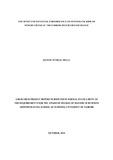| dc.description.abstract | This study sought to establish the effects of firms’ financial performance on systematic
risk. Specifically the study sought to establish the effect of operational efficiency,
liquidity, leverage and profitability on systematic risk of firms listed at the Nairobi
Securities Exchange. The study used a descriptive research design. The target population
was 62 companies listed at the Nairobi Securities Exchange by the end of 2013.
Judgmental sampling was used to select the sample of study by which a sample of 20
companies that were continuously traded between 2009 and 2013 excluding the financial
institutions was selected. Secondary data obtained from the Nairobi Securities Exchange
handbook and authorized data vendors was used. The data was analyzed using regression
analysis with beta coefficient as the dependent variables and total assets turnover, current
ratio, debt to assets ratio and net profit margin as the independent variables. The
regression model was evaluated using the coefficient of determination R2 while the
overall significance of the regression results was tested using F statistic at a 5% level of
significance. The significance of the independent variables was tested using t-test at 5%
significance level. The study found that the following measures of financial performance;
total assets turnover, current ratio and net profit margin had a positive but statistically
insignificant effect on systematic risk. Leverage was found to have a positive and
statistically significant effect on systematic risk. The regression model had a coefficient
of determination R2 of 7.5%. The F-test for the significance of the overall regression
indicated that the regression was not significant at 5% level of significance. The study
concluded that financial performance measure; total assets turnover, current ratio and net
profit margin had a positive but statistically insignificant effect on beta while debt to
assets ratio had a positive and statistically significant effect on beta coefficient. The study
recommends that since debt ratio had a positive and significant effect on beta coefficient
managers should be aware of the increasing effect of systematic risk on the cost of capital
due to leverage. It also recommends that since assets turnover, liquidity and net profit
margin did not have a significant effect on beta managers should not focus on managing
operational efficiency, liquidity and profitability as measures of altering the companies
systematic risk exposure. | en_US |

